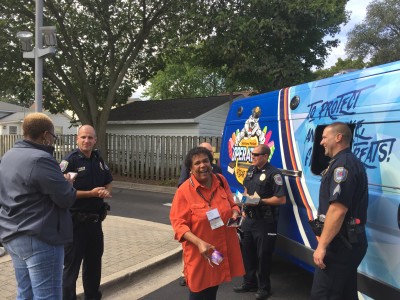 The city of Holland created a Human Relations Commission in 1966 with the mission of recognizing and responding to inequity and injustice in the community. It is comprised of nine citizens, two youth from the Holland Youth Advisory Council, and one councilmember. Esther Fifelski, Holland’s Human Relations Coordinator says that all communities should plan ahead. Meaning, they should pay attention to the local and national landscape, they should create a plan for a racial or bias incident, and should look for better ways to serve their community. Her presentation was followed by Holland’s Director of Public Safety, Matt Messer, who shared information on the ways that the Holland Police Department is engaging with citizens in the community:
The city of Holland created a Human Relations Commission in 1966 with the mission of recognizing and responding to inequity and injustice in the community. It is comprised of nine citizens, two youth from the Holland Youth Advisory Council, and one councilmember. Esther Fifelski, Holland’s Human Relations Coordinator says that all communities should plan ahead. Meaning, they should pay attention to the local and national landscape, they should create a plan for a racial or bias incident, and should look for better ways to serve their community. Her presentation was followed by Holland’s Director of Public Safety, Matt Messer, who shared information on the ways that the Holland Police Department is engaging with citizens in the community:
- The police officers have a donated ice cream truck that they take around the city to distribute donated ice cream to citizens, through their Operation Polar Patrol. According to Chief Messer, there are only five departments in the nation to offer this service, one of the other five being the city of Oak Park, Michigan. (Go Michigan for being at the forefront of this fun and tasty engagement tool!)
- One day during the Holiday season the officers spend the day Pumping up the Holiday Spirit. They pump gas for citizens and give them $20 worth of donated gas (from area stores). Imagine the surprise the citizens have when the officers offer to pump their gas, and the gas is free nonetheless!
- Pay it Forward with Coffee has the same concept as the gas station surprise, except that the officers are handing out free coffee, inside and outside of local coffee shops.
The Holland Public Safety department has several other community projects that they engage in, and although most items are donated from businesses within the community, the chief budgets a minimal amount of $6,000-$8000 for these positive and creative interactions, and the returns are invaluable. These interactions help to change the perception of the police, they help to build relationships between the police and the citizens which they serve, and most importantly they can instill a sense of trust.
Ottawa County Sheriff Steve Kempler, and Anthony Lewis from the Michigan Department of Civil Rights, shared information about the ALPACT program. Advocates and Leaders for Police and Community Trust (ALPACT) in Ottawa County is a program that is comprised of community leaders, civil rights and civil liberties organizations, and law enforcement leaders. The members meet regularly to look at and examine issues affecting police and community relations. The program started out in the Detroit area, when local clergy had concerns about racial profiling that was taking place. ALPACT is active in 11 cities across the state of Michigan. It seems to me like we should have one in every county, no?
Muskegon Heights Mayor, Kimberley Sims, talked about some of the challenges faced in her community and shared best practices that they’ve initiated, including putting a strong emphasis on customer service throughout all city departments, including the police department, and the purchase of two-way body cameras for their officers. The cameras help to deter negative interactions from citizens and officers
The afternoon panel was made up of current and former law enforcement officers who spoke about training, accreditation, and recruitment.
The Michigan Law Enforcement Accreditation program was created in 2016 by the Michigan Association of Chiefs of Police (MACP). This program was set up to establish and maintain standards that represent current professional law enforcement practices; to increase effectiveness and efficiency in the delivery of law enforcement services, and to establish standards that address, and reduce liability for the agency and its members. For more information about the accreditation program visit, http://www.michiganpolicechiefs.org/
Did you know that the average age of a police officer in Michigan is 41? According to Bob Stevenson, executive director of MACP, Michigan is already in crisis mode with the lack of officers needed to fill positions that are open. Chief Cliff Block from Midland reported that it’s getting harder and harder to recruit officers. I’m sure that’s a statement that many of your communities can relate to.
According to retired Chief Charles Castle, some people simply can’t afford to be without pay for the 15, or so, weeks that it takes to go through the police academy. We understand that some communities aren’t able to afford to help put officers through the academy but maybe there are other stakeholders in your community that might be willing to assist you with this? Another idea shared in the program, is to bring potential officers in as cadets, watch them for 3-4 years, get to know their character, and if you decide to hire them, then put them through the academy.
In summary, I’d like to share best practices from the city of Holland Human Relations Commission:
- Listen. People want to be heard and affirmed.
- Undermined citizens and organizations; undermine your work.
- Celebrate your community!
Lost relationships take years to build up so communicate, and focus on the relationships with your citizens now.
